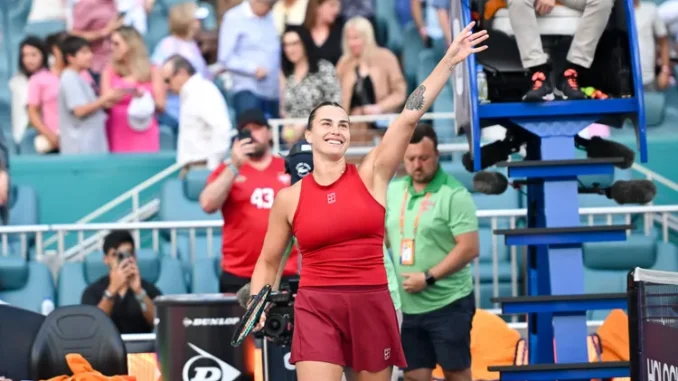
The Hard Rock Stadium glowed under the Miami twilight on March 29, 2025, as Aryna Sabalenka, the world’s top-ranked tennis titan, lifted the Miami Open trophy after a commanding 7-5, 6-2 victory over Jessica Pegula. For Sabalenka, a Belarusian powerhouse who’s made Miami her part-time home, this wasn’t just her first triumph at the tournament—it was a sweet redemption after a season peppered with near-misses in major finals. As she stood before a jubilant crowd, trophy in hand and a $1.1 million prize in her pocket, she couldn’t resist a playful jab at the weather that nearly derailed her moment. “Thank God the rain stopped,” she quipped, her grin wide and infectious. “It felt like Miami was crying that I won this tournament.”
The rain delays had indeed cast a shadow over the day, pushing the final’s start time past 4 p.m. as dark clouds loomed, threatening to wash away Sabalenka’s shot at glory. She’d battled through similar frustrations before—two final-round defeats earlier this year at the Australian Open and Indian Wells had left her hungry for a breakthrough. But in Miami, where she’s forged a deep connection with the courts and the community, nothing was going to dampen her spirit. “I’m speechless,” she admitted, her voice catching with emotion as she reflected on the victory’s weight. “The last couple of finals were really tough and tight and close ones for me, so going into this one I was so focused on myself, playing point by point. It feels super special—my first in Miami.”
Sabalenka’s path to the title was a masterclass in dominance. Across six matches, she didn’t drop a single set, her thunderous forehand and pinpoint serves dismantling opponents with ruthless efficiency. In the final, Pegula—a resilient American ranked No. 4 and a local favorite—put up a fight, trading breaks in a tense first set that saw seven service games tumble. “It was back and forth the whole match,” Sabalenka noted, giving a nod to Pegula’s tenacity. “Even after each game she broke, I was fighting back and breaking her back.” The second set, though, was all Sabalenka—her 31 winners overwhelmed Pegula’s 12, and a blistering backhand sealed the deal, leaving the crowd roaring and her rival gracious in defeat. “You’re the best player in the world for a reason,” Pegula conceded with a wry smile, lamenting her third straight final loss to Sabalenka in under a year.
That $1.1 million check wasn’t just a reward—it was a milestone, pushing Sabalenka’s career earnings to $33.6 million and nudging her past Angelique Kerber into ninth on the women’s all-time prize money list. At 26, with three Grand Slam titles and eight WTA 1000 crowns, she’s not just collecting checks—she’s rewriting the sport’s financial hierarchy. Pegula, meanwhile, walked away with $597,890, a consolation for a valiant run that included three-set epics against Emma Raducanu and Alexandra Eala. “If I could share the trophy, prize money, points, I’d share it with you,” Sabalenka teased her opponent, a lighthearted gesture that underscored their mutual respect despite a 7-2 head-to-head now firmly tilted in her favor.
The victory carried extra weight for Sabalenka, who’d faced personal turmoil after losing her former partner Konstantin Koltsov a year ago. “Thank you my team for everything, you’re not my team, you’re my family,” she told the crowd, her gratitude spilling over to her boyfriend and fans too. Her celebration plans were as bold as her game: “Definitely tequila!” she laughed, promising a private toast to a triumph six years in the making—her previous best in Miami had been a pair of quarterfinal runs. This time, she’d steamrolled past defending champion Danielle Collins and No. 6 seed Jasmine Paolini, her five matches averaging just over an hour each, a testament to her efficiency.
For Pegula, the loss was bittersweet. With NFL commissioner Roger Goodell in the stands—tied to league meetings nearby—and her family’s sports empire looming large, she’d hoped to deliver a fairy-tale ending in her adopted home state. “Congrats, Aryna, to you and your team,” she said, her humor masking the sting. “Three finals… I really don’t wanna like you right now.” Yet, her sixth WTA 1000 final keeps her in the top five, a platform to regroup for the clay ahead.
As Sabalenka hoisted the Butch Buchholz trophy, the rain-soaked day faded into a memory, replaced by the glow of a champion who’d turned Miami’s tears into her triumph. With a 23-4 record this season and a legacy growing by the day, she proved that even the skies couldn’t dim her shine. The tequila would flow, the crowd would cheer, and Sabalenka—joking or not—had made Miami hers at last.
Leave a Reply